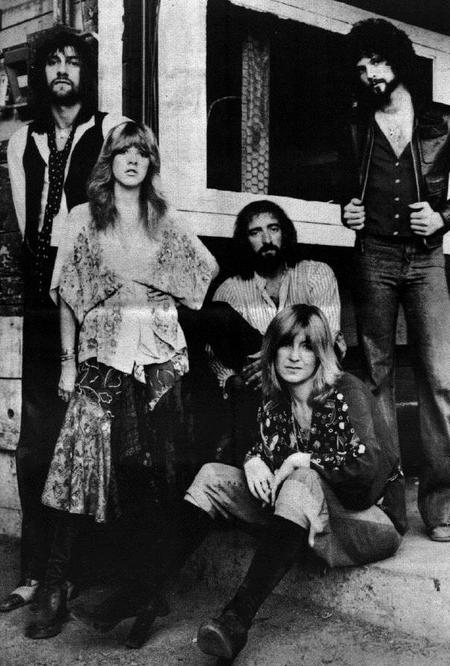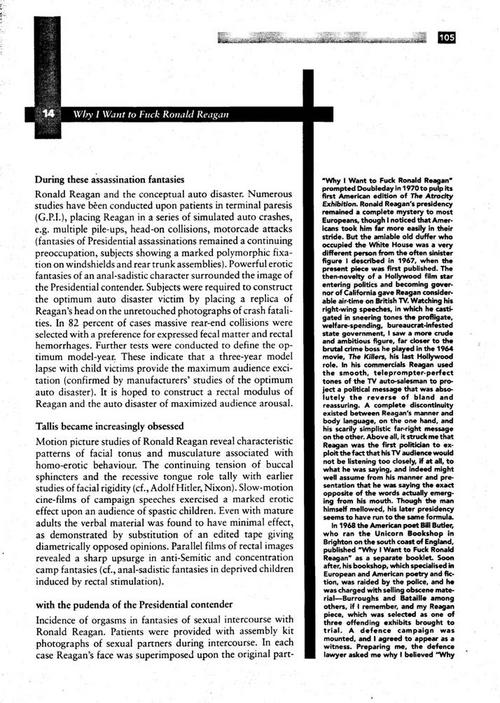June 30, 2004
KOONS REALLY DOES THINK HE'S MICHELANGELO
For those that haven't noticed, Marcello's spiffing new home is Koons Really Does Think He's Michelangelo. It's got a comments facility! And hyperlinks!
Almost like a blog! :-)
Seriously, though, it's wonderful that Marcello hasn't made good on his promise to discontinue blogging.
I would appreciate a larger font though.
MICHAEL GRADE AGREES WITH ME
Encouraging noises from the BBC, ahead of their bid for a renewal of the licence fee. Grade is apparently set to reposition the BBC as a quality broadcaster, with a commitment to more single dramas, prime-time current affairs and culture shows, and more investment in the excellent BBC Four.
Single dramas: now that's significant. The problem with the BBC is not so much its lack of investment in drama per se, but rather the type of drama ('lavish' costume, period dramas) which has become the default option for the corporation.
Let's hope that Grade is serious about giving substance to these claims.
ULCERATED TORRENT
"A master of the ulcerated torrent" eh? Like that - it's going on the cv.
Incidentally, Matt commented the other day (25.06 - no permalinx on the hyper-minimalist Woebotnik, natch) that top 100 lists are 'almost constructed to shore off the sniping remarks of one's peers'. Well, I can say honestly that there was nothing contrived on my list. I simply thought about which records I've bought (and some which I've, not to my credit, gotten rid of) over the years, and tried to decide which ones had most impact on me.
The eagle-eyed amongst you might have noticed that I've put the top 100 up on the sidebar. I've decided to treat is as working document; at least then it won't be a purely reactive blast against the Observer's list. In the first instance, I've hyperlinked to pieces I've already written on particular albums at k-punk. In future, I hope to build up something on every one of the albums. When I'm short of inspiration, I can also post about one of the hot 100...
And Matt's so right.
People don't get heated enough about this sort of thing. That's part of the syndrome actually: politeness, respect, eclecticism, all discourse part of the PR industry, everything goes....
There was a reek of semen that quickened the blood
Fantastic interview with Ballard in the Guardian last week that somehow passed me by
(that's what you get for reading the Times, I spose).
Especially given recent hoo-hahs here, I particularly liked his comments on the contemporary art scene:
'Today's art scene? Very difficult to judge, since celebrity and the media presence of the artists are inextricably linked with their work. The great artists of the past century tended to become famous in the later stages of their careers, whereas today fame is built into the artists' work from the start, as in the cases of Emin and Hirst.
There's a logic today that places a greater value on celebrity the less it is accompanied by actual achievement. I don't think it's possible to touch people's imagination today by aesthetic means. Emin's bed, Hirst's sheep, the Chapmans' defaced Goyas are psychological provocations, mental tests where the aesthetic elements are no more than a framing device.
It's interesting that this should be the case. I assume it is because our environment today, by and large a media landscape, is oversaturated by aestheticising elements (TV ads, packaging, design and presentation, styling and so on) but impoverished and numbed as far as its psychological depth is concerned.
Artists (though sadly not writers) tend to move to where the battle is joined most fiercely. Everything in today's world is stylised and packaged, and Emin and Hirst are trying to say, this is a bed, this is death, this is a body. They are trying to redefine the basic elements of reality, to recapture them from the ad men who have hijacked our world.
Emin's beautiful body is her one great idea, but I suspect that she is rather prudish, which means that there are limits to the use she can make of her body and its rackety past. Meanwhile, too much is made of conceptual art - putting it crudely, someone has been shitting in Duchamp's urinal, and there is an urgent need for a strong dose of critical Parazone.'
June 29, 2004
ALSO BRILLIANT
Estelle - '1980'
Does everything the Streets want to (paying hyper-attention to the micro-minutiae of everydaze Britcult life), but with a sweeping, exhilararating swagger that Skinner's stuttering stop-start cackhanded sampling will never approximate....
Marvellous stuff.
What a great year for singles.
I'd rather Fleetwood Mac...
[Prefatory note: I’ve been preparing this post for a while, cultivating an obsession you might say, but putting it up now might be regarded as perverse if not to say self-defeating timing, since it seems to contradict the burn-all-nostalgia, the past-is-dead message of yesterday’s Glastonbury fulminations. Only superficially, though. What irritates and irks about Glastonbury is what irritates and irks about students and Indie (for it is their festival, the celebration of their culture): namely, that it occupies a position of alleged marginality only to clog it full of what is most horribly mainstream and moribund*. Far more interesting to do the reverse – to occupy the mainstream and redirect, deflect and infect it. OK, OK, this sounds like entryism, and we know how discredited that philosophy is, right? But if you’re not persuaded by me, listen to Greil Marcus: ‘With its insistence on perceptions snatched out of a blur, drawing on (but never imitating) Jamaican dub and ancient Appalachian ballads, Fleetwood Mac is subverting the music from the inside out, very much like one of John Le Carre’s moles – who, planted in the heart of the establishment, does not begin his secret campaign of sabotage and betrayal until everyone has gotten used to him, and takes him for granted.’ (‘Fever in the Marketplace: Real Life Rock Top Ten 1979’, In the Fascist Bathroom, 82-83]
We like Le Carre comparisons here…
I love Fleetwood Mac in the way that you love those things that you come to late in life.
Being born in the late sixties and coming to pop awareness in the early eighties meant that my first taste of F M was the singles from Tango in the Night (1987), easily dismissed at the time as appealing enough but emollient, depthless MOR confections. The only trace of the preposterously successful Rumours (1977) by then was the instrumental section of ‘The Chain’ used as the theme tune for the BBC’s motor racing coverage. (Later, I’d encounter ‘Go Your Own Way’ when Scorsese used it in Casino.)
In America, it could not but be different. Rumours cast a vast shadow over US rock and pop that would be inescapable for a generation.
Fleetwood Mac, Simon wrote in his 1994 piece on Tusk were what America had instead of punk. In their own ways, both Rumours and Never Mind the Bollocks were about saying goodbye to the past: but where the Pistols adopted a scorched earth policy, carpet bombing the whole of rock history (even it, to Lydon’s chagrin, they were unable to escape it), Fleetwood Mac favoured reinvention, the painful exploration of wounds old and new, a kind of gestalt therapy that would require decades of working through. Compare Rotten’s ‘No Future’ with McVie’s ‘Don’t stop/ thinking about tomorrow’ for a snapshot of the differences between US and UK rock in the late seventies (and between American and British psychology in general). ‘Don’t Stop’ had exactly the kind of message that a shellshocked America, dragging itself out of the mire of Vietnam, was ready to hear, just as the dispossessed of Callaghan’s Britain, stumbling towards the Winter of Discontent, took a fatalistic delight in Rotten’s incendiary nihilism. (Bill Clinton would famously use ‘Don’t Stop’ as the talismanic theme-tune for another would-be American renewal, in his election campaign of1992 – but don’t let the patronage of that lying sleaze put you off, please.)
American pop is slow to change but essentially progressive. By contrast, British pop, fuelled by speed and e, moves in fits and starts, breaks and loops, sudden surges, depressive longeurs and doublings-back. That’s why the US could never produce nor properly appreciate Oasis. And why the UK wouldn’t nurture a band like the Nicks-Buckingham version of Fleetwood Mac.
The groundwork for Rumours was laid on the self-titled album of two years before. The roles were already established. Of the three songwriters, Christine McVie, along with the rhythm section of then-husband John and Mick Fleetwood, was the link to the band’s past. She was the reliable provider of bankable melodic pop, Mac’s McCartney. But the future lay with the two young Americans recruited to resuscitate the flatlining ex-pat Brit blues band, Lindsey Buckingham and Stevie Nicks. Buckingham, whose compositions bookend the album, brought angst, anger and a fierce, combustible energy. ‘Monday Morning’ looks ahead with an unsteady gaze, unable to convince itself that the easiness of mind that it pines for could ever be achieved. The troubled waters of ‘So Afraid’ roil with unresolved anxieties. But it’s Nicks who is the most sublimely, uncannily fascinating.
Stevie’s preoccupations are easily caricatured. Yet for all her rep as an ethereal, dippy hippie, Nicks’ femysticism is surprisingly material: her becomings-woman - always associated with physical instantiations (storms, oceans, birds) - invariably pass by way of becomings-animal to becoming-the-cosmos. The entity she invokes is less the Mother Earth of traditional feminine symbolism (whether on loan from the male imaginary or reappropriated by feminists) than what Can called Mother Sky, the great cosmic seducer who lures you into flight rather than roots you to the ground.
‘Rhiannon’ is her first anthem to this elusive, forever fugitive agent of female flux. The song - a paean to she who cannot be pinned down or defined, the temptress who ‘rules her life like a bird in flight’ - could be the female reply to The Stones’ ‘Ruby Tuesday’. Nicks renders it as a gentle taunt to Rhiannon’s male pursuers, those who would own or possess her: ‘Will you ever win?’ ‘Landslide’, elemental and occasionally elliptical, is an achingly pretty rumination on passing time. It auditions what might be called Nicks’ Space-Country sound. (It’s no surprise that, when it was covered by a the Dixie Chicks last year, Stevie won a Country award.)
Nicks’ poised female strength (in song, if not in life) couldn’t form a greater contrast with Mcvie’s recorded persona. Christine’s reputation as the band’s ‘sensible’ member is undeserved. On the contrary, Mcvie’s songs express a submissiveness so consistent as to be almost pathologically masochistic. ‘Say That You Love Me’, Christine’s ‘Will You Still Love Me Tomorrow?’, boasts one of her most winning melodies, but it speaks of distrust and betrayal. The impending-end-of-the-McVie-marriage song, ‘Over My Head’, is painfully equivocal, not sure whether it wants to continue drowning in what sounds like an abusive subordination to the Other (‘It sure feels good’) or come up for air (‘am I wasting my time’).
But Fleetwood Mac is only the prelude to Rumours, which, from its first seconds, feels epochal. No need to dwell on the soap operas which attended its production, the final disintegration of the McVie marriage and the descent into acrimony of the Nicks-Buckingham affair, because that story has been endlessly told, nowhere better than on the blood-letting catharsis of the songs themselves.
The Chain’, credited to the whole band, is the core around which the rest of the album grows; its central image calls up all the contradictions and compromises of their complexly intertwined dependencies and co-dependencies: bondage and fellowship, bondage as fellowship, fellowship as bondage.
McVie provides the joy (the solo-piano epiphany of ‘Songbird’, the giddy first-flush butterfly flutters of ‘You Make Loving Fun’ and that ageless tribute to optimism, ‘Don’t Stop’), but the catalytic core of the album is the dialogue between Buckingham and Nicks.
‘Go Your Own Way’ is the sound of Buckingham warring within himself, alternately placating then damning his lover’s phantasmatic image, the verses supplicative (‘If I could/ I would give you my world’), the chorus subsiding into desperate anger, the song lurching between ‘I’ll love you forever’ and ‘fuck you, it’s over’ before finally incandescing in an (instrumental) ecstasy of rage. I (don’t) want you back.
Stevie’s ‘Dreams’ responds not with anger, not even reproach, but anticipates the lover becoming snared in his own rueful memories which are destined to give the lie to any cheap conquests he might temporarily enjoy (‘Women they will come and they will go/ But when the rain washes you clean, you’ll know.’)
The track I’m continually drawn back, though, to is the closer, Nicks’ Gold Dust Woman’. It’s an ending to an album as suspended, as poised, as the dying shimmer of Roxy Music’s For Your Pleasure. An eerily, ironically prophetic future autobiography of Nicks’ addictions (first, to cocaine and later to prescription tranquillizers: ‘rock on gold dust woman/ take your silver spoon/ and dig your grave’), the track wouldn’t be out of place on Tago Mago. The Gold Dust Woman, a ‘dragon’, a ‘spider’, is the female anti-type to Rhiannon: imprisoned and imprisoning, quite literally a femme fatale, a life-denier rather than a fleeing free spirit.
Rumours is, for better or worse, emblematic of its time, unable to escape the seventies it so effectively soundtracks. Its successor, Tusk (1979), however, is untimely, impossibly intimate and unassimilably eccentric, largely because of Buckingham’s megalomaniac production, which, in addition to giving the whole album a 3D hypervividness, made it a genre-of-one unrepeatable singularity.

Tusk includes some of McVie’s most alluring if less immediate songs: the opener, ‘Over and Over’, its lovely, lazy groove, offset by Lindsey’s slide guitar, perfectly evokes the giddying incredulity of falling in love: ‘Could it be me? Could it really, really be?’. (To which Buckingham’s ‘What Makes You Think You’re the One?’ might be the spiteful riposte.) ‘Never Make Me Cry’ is a rarely beautiful, fragile plaint, poised, as ever, between faith and fear. But ‘Brown Eyes’, like a ballad played by Miles circa In a Silent Way, is McVie’s most entrancing - and entranced song - an eddying, swirlpool of qualified rapture, stoned on the prospect of the long yearned-for love, but sobered by the memories of past betrayals.
Once again, though, it is the contrast between Nicks and Buckingham that provides the album’s most compelling source of drama. Here, more even than on Rumours, the differences between male and female libidinal economies are exquisitely explored. Buckingham’s compositions – some of them less than two minutes in length - ejaculate to a hurried conclusion, while the typical Nicks’ song lingers for a good five, six minutes. Lindsey founds a bizarre microgenre with almost all of his songs, from the deranged dadaist hillbilly boogie thrash of ‘The Ledge’, ‘Not That Funny’ and 'That's Enough for Me' through to the gorgeous, nerve-taut Pet Sounds harmony-machines such as ‘That’s All For Everyone’ and ‘Walk a Thin Line’ and the howl-at-the-moon Partched blooz of the mournful ‘Save Me a Place’.
Where Buckingham burns, Stevie smoulders, surges and swell, shimmers and simmers.
Tusk showcases three of Stevie’s – and therefore anyone’s - best songs. Simon said everything that needed to be said about the enigmatic ‘Sara’: ‘Siphoning sheer nectar from her throat, Stevie is cradled in Buckingham's shimmerscape production--cascades of scintillating acoustic guitars, susurrating plumes of angel-breath harmonies, drums that seem to billow in out and of the mix.’ I certainly can’t do better than that!
You won't ever hear a more powerful song about the fading afterburn of a failed relationship than 'Storms'. Hear it as the sequel to the Supremes’ ‘Love Hangover’. If ‘Love Hangover’ is about the immediate shock of rejection, about the literal inability to accept that it’s over, about a willing indulgence in the negative ecstasy of pain, ‘Storms’ is about the moment when denial is no longer possible, when the endorphin rush gives way to a numbness, when your body’s no longer able to cry, when you have to take the first step towards on that always ghastly journey, ‘moving on’. ‘Every night that goes between/ I feel a little less…’
‘Beautiful Child’ is the third in this incredible triptych. As so often with Stevie, it's elliptical, elusive, but evocative. Its images and affects seem to lock in directly to the unconscious. The song appears to be about a slow-smouldering love affair ('you fell in love when I was only ten') - well, less an affair than a kind of fated betrothal, a Heathcliff and Cathy lifemeld, now ended - seemingly forever (because of death?) Musically, it's like a clockwork-machine gone awry (Simon: 'The effect is like the heart is literally broken, a clockwork device gone out of synch'), a staggeringly beautiful paean to regret and loss, Stevie's multi-tracked vocal haunting itself...
These three songs suspend rock's blues-derived, male-modelled, tension-release 'testicular thermodynamics' to explore a slow-burn series of plateaus.
Leaving aside the forgettable Mirage, FM’s next most significant moment was 1987’s Tango in the Night, the album that Buckingham rescued from the band’s coked out indifference, at the cost of his own departure. By this time, Stevie was the furthest gone, a catatonic zombie wheeled into the studio to perform her contributions. And she sounds like that, autopiloting through the meandering AOR doodles of ‘Seven Wonders’ and ‘Welcome to the Room… Sara’. McVie contributes two of the album’s mega-hits; the Afropop effervescence of ‘Everywhere’, and, one of her most disturbing hymns to supplication, ‘Little Lies’ . But the highlight, appropriately, belongs to Buckingham; his ‘Big Love’ sounds like the copulation of Duchampian desiring machines. Marcello is right to invoke Horn and ZTT, though for me, the album displays many of Horn’s vices, an uninvolving, pristine monumentalism, cavernous and vacuous.
Finally, then, to the MTV/VH-1 comeback special from 1997, The Dance.
Watching, you can feel all the electricity that’s lacking at Glastonbury crackle. It’s a masterclass in rock performance – which doesn’t mean histrionic posturing (Bono), end of the pier metamugging (Robbie) or tonsil-rupturing vocal gymnastics (Xtina).
There’s something almost intangible but immediately palpable that separates, say, Macca at Glastonbury from The Dance. Macca hits all the notes and technically performs ‘well’. But what FM do that McCartney didn’t happens between the notes. It’s the difference between acting and acting out. On The Dance, Fleetwood Mac occupy the affective space of the songs, they don’t simply play them. They enter into a performance trance. The result is that every song matters.
Everything is dramatic, including the band’s arrangement on stage.
At the back, the group’s engine room, itself a study in contrasts. Mick Fleetwood, effusive, gregarious, an attention-junkie, gurns, leers and lurches like some hyperactive Ray Harryhausen-giant, while John McVie, baseball gap pulled down over his eyes, lurks in the shadows in the manner of unassuming mechanic. On the right, slightly detached, vaguely inhibited, uncomfortably stiff, dressed like a glamorous headmistress, Christine McVie: sensible and sentimental. But the real action is front and left. Stevie, leaning forward in a witchy hunch, swathed in shawls and scarves, sensuality incarnate, her gaze fixated, for most of the time, on Buckingham (body taut, his head rolled back), both well aware that the source of the group’s sorcerous power is the interplay between the two of them.

Live, Buckingham is the revelation. Sure, by now he can play Stevie’s courtly suitor to perfection (check his attentive acoustic picking on ‘Landslide’), but he comes into his own on songs like ‘My Little Demon’, ‘So Afraid’ and ‘Go Insane’ where he stakes his claim to be considered the inheritor of howling, anguished bluesman, tradition initiated by Robert Johnson. Imagine Led Zeppelin if they were good; i.e. with all the nihilibidinal anguish, but minus Plant’s caterwauling histrionics or Page’s overelaboration (errr, what’s left?) And look at what he does to Tango in the Night’s ‘Big Love’. Scrabbling it out solo on an acoustic guitar, he strips the song’s surface gloss away to reveal a raw, bleeding core of blues anguish and failed ambition.
Once again, though, it’s the luminescent Nicks who is the stunning eye of the storm. She’s grown into ‘Landslide’, a song which sounded too old for a woman in her twenties. As she sings the line, 'I’ve grown older, too', she gives a wistful, knowing shrug….. But it's ‘Silver Springs’, the song criminally left off Rumours for 'lack of space', that is the highlight of the DVD. Stevie shows that she could out Alanis Alanis twenty years before Jagged Little Pill. She tries to sound graceful and in control, if regretful ('Is she pretty? ... Was it worth it? ... I don't wanna know'), when out of nowhere, the song is swept up by a tempest of raw emotion, Stevie transformed into a harpie-banshee agent of revenge and implacable obsession - 'Time casts its spell on you/ But you won't forget me... You'll never get away from the woman who loves you... Words are just a fool.' She has always been a storm, indeed, and like the X-Woman, she is superbly impressive at marshalling and controlling her elemental power.

IF YOU’RE EVER GOING TO BUY A DVD OF LIVE MUSIC, BUY THIS ONE…
I've not yet organized my thoughts on last year's comeback LP,
'Say You Will', but you should definitely read Marcello's thoughts on it.
While we're at it, Marcello's general FM overview is indispensable, as his (at least I assume it's his) Uncut review of the Redux re-releases of Fleetwood Mac, Rumours and Tusk.
* Bathetic footnote: the word ‘moribund’ will always remind me of Alan Partridge on‘Knowing Me, Knowing You’, countering accusations that it’s ‘moribund’ with a (scarcely credible) positive assessment. ‘Not my words. The words of Mike Taylor of TV Quick.’
KEENAN'S 100
Speaking of charts - I think Dave Keenan's Best 100 albums ever is a very enjoyable list. Best description of an album I haven't heard, on Steeleye Span's Please to See the King: a 'droning hybrid that at its best sounds like The Velvet Underground trapped somewhere in the 17th century.'
ANOTHER HOT 100
Nick Gutterbreakz joins in the fun...
Fad Gadget, yeh, gotta check him out more thoroughly, ditto Kevin Ayers. Is the Plastic Ono band good? (Genuine question.) Ultramarine, yeh, an oversight on k-p's part. Boards of Canada, whisper it, I've never heard. Just bought White Noise Electric Storm. Junior Boys' Matt Didemus strongly recommended the Zombies to me when he was over in the UK recently...
June 28, 2004
The by now traditional Glasto rant
'What really drives student entrepreneurs into a premature commercial detachment is their audiences. Every new ents officer learns from first-term results; black music has no student draw; known bands are preferrred to unknown bands; no one in the student union cares who the latest critical cult figures are. Students are the great, middle-class, middle-brow bastion of British rock and, after twenty years, their tastes aren't about to be shaken.'
So wrote Simon Frith in 1985. Well, after twenty further years, I see no reason to revise Frith's judgement.
These reflections have been prompted by Glastonbury, naturally, which is now nearly officially the end-of-college-year prom for Britain's student (and griduate) population.
I should preface my remarks here by referring to Ian Penman's comments of more or less this time last year - and if anyone doubts what a LOSS IP is, and I'm sure no-one does, just read his Glastonburial 03 posts. Like Penman, I feel annoyed at myself for letting it get to me. The Pawboy put it perfectly: ' I still get agitated, perplexed - I wouldn't actually say 'depressed', that's not true - but something like Glastonbury irks and niggles me, still, in a way I wish it didn't. I really do wish it didn't.
...
Could you P-L-E-A-S-E knock me off my feet, for a while?
P-L-E-A-S-E knock me off my feet for a while . . .
'Cos there's a GALAXY OF EMPTINESS tonight.'
All that said, and obviously I didn't GO - christ, you didn't imagine that IN A MILLION YEARS I would, did you? - and obviously the telly coverage is as nothing compared to the real experience: cos there's like MUD there (and weren't Jo Wiley's mud anecdotes abso-fucking-lutely, screamingly hilarious?), and FIRE-EATERs and JUGGLERS ..... (Has any cultural event of any significance ever happened whenever a juggler is within a hundred mile radius?) Penman again: I mean, music in a field - in the daytime? Wtf? It's almost deliberately delibidinizing....
But that's the agenda, really, the secret purpose of this now unopposed embourgeoisement of rock culture UK. What's positively sinister about Glastonbury now is that it's not just accidentally crap, it's systematically crap - the hidden message screams out: it's all finished, roll up, roll up, for the necrophiliac spectacle, it's all over
ABANDON ALL CULTURAL VITALITY ALL YE WHO ENTER HERE
Those who only remember the past are condemned to repeat it
Forever
The bill was almost parodicallly LCD MOR, so safe and organic and wholesome and unimpeachable and uncontroversial:
Macca! Oasis! Franz Ferdinand!
No black folks of course unless they're well into their sixties (James Brown; Toots and the Maytals), but no whiteys EITHER unless they're into their sixties (Macca) or sound like they could be in their sixties (Franz Ferdinand, Scissor Sisters)...
Go along with mum and dad, read the Guardian, smoke some dope --- the whole of rock history fugged out into some blandly beneficient museum of dead forms, all breaks, disontinuities, ruptures edited out or incorporated back in (the 'Dance' stage), their force and novelty subdued and airbrushed into a joyless carnival of secondhand History for the stupefied delectation of the Last Men.... (And didn't they look so BORED? Well, wouldn't you?)
The significance of generation gaps wasn't the tired Oedipal merry-go-round so much as that they pointed to a culture of constant renewal - how long is a generation? in any vital culture, it's a matter of weeks or months, here? Well, the fact that the generation gap doesn't make any sense any more at Glastonbury - balding accountants getting down to Basement Jaxx, Jemima studying Fine Arts at Sussex being 'blown away' by Macca ('he was so gid!') - is a sure sign that this is a 'culture' as energetic as the contents of one of Hirst's tanks.
RESPECT, respect for everyone .... (when culture demands respect, when respect is the appropriate response to culture, you know it's either died in its sleep or been killed). Respect is how they killed Shakespeare, make it all a part of the National Heritage....
A tactical nuclear strike wd have taken out virtually everything that's debilitating, deadening and reactive about the Brit culture industry (the whole NME staff: bargain!), much of the current ruling class and a significant portion of our future masters too (all those aspiring Tony Blairs).
Once the bombers have hit Glasto, set the co-ordinates for Ibiza, things might start improving around here...
June 26, 2004
HYPERSTITION UPDATE
The Hyperstition blog off to a flyer --- a unique experiment in elaborating/ producing/ exploring theory on the fly --- Come on over, more participants always welcome, always needed -----
June 23, 2004
K-PUNK TOP 100 BRITISH ALBUMS
OK, indulge me, I've indulged myself....
It's partly the disgust, rage and disappointment of actually seeing the Observer list : where it's not drably canonic, it's absurd (and not in any interesting way, absurd in that there are obviously people out there who get paid to write about music whose taste has not moved on since they were first year undergraduates); and where it's not canonic or absurd, it's infuriating. Lloyd Cole and the Commotions! Fucking Lloyd 'couldn't write his way out of a paper bag' (MES) Cole. Good God, the only place I expected to see his smug chubby chops again was staring at me from out of a car boot.
And I can hardly bear to say it, but The Stone Roses being placed, never mind about getting to number 1. This is far more depressing than reality TV pop, jeez, people who are prepared, in 2004, to vote that over-hyped slice of slight retro-puffery as the best British album ever made , well, they deserve only the worst, the most mediocre, of everything. Yeh, you can understand a momentary aberration when it came out, people getting carried away, intoxicated on Brown's manc swagger (I mean, Brown's solo stuff and that single he did with UNKLE obviously tower above anything the Roses achieved; and they should be placed oooh as high as 312), temporarily letting the guard down and the standards slip when there was a paucity of alternatives. But, now, in 2004, after a decade of time-shattering rhythmic psychedelia, after Loveless, after garage, do we really need to stir that undead r and r cavader? Oasis, too. And Echo and the 'moon in june' Bunnymen.
All those tedious undergrad poster boys. What dream-deprived, desire-decayed, quotidian mire do those who voted live in?
So it's partly the rage, and partly the inspiration of Marcello and, even more, of Jim (still no permalinx; see Monday 21st June entry), partly because it's a bit of fun....
k-punk's top 100 british albums --- arranged by decade (though I'm sure I've got some of the dates wrong, I just did it by memory). Naturally, it's been thrown together, so it's a bit rorshach blot, not rationally considered (and possibly all the better for that), not objective (what would that mean?), not even pretending to be, it's an attempt, not to Mount Rushmore-like inscribe in stone, with the Big Other at my shoulder, a sacred list of albums that are 'Good', but to record those albums that were Events in my life, that changed things, that forever altered my scanning patterns, my expectations, perceptions...
There are almost certainly horrendous omissions ...
Yes, it's too white, too male (but then, so am I), the eighties are over-represented (but then, that's when I was most impressionable)....
00’s
Dizzee Rascal – Boy in Da Corner
Oxide and Neutrino Present: the Solid Sound of the Underground
Oxide and Neutrino – Execute
David Sylvian – Blemish
90’s
187 Lockdown – 187 Lockdown
Tricky – Pre Millennium Tension
Goldie – Saturnz Return
Massive Attack – Protection
Breakdown Presents: Drum & Bass Selection 3
Suburban Base and Moving Shadow Present The Joint LP
Various - Techsteppin’
The Dark Side: Hardcore Drum and Bass Style (React)
Marvellous Cain – Gun Talk
World of Twist – Quality Street
Tricky – Maxinquaye
Aphex Twin - Selected Ambient Works
Basement Jaxx - Remedy
MBV – Loveless (also here)
Barry Adamson - Soul Murder
Altern 8 – Full on Mask Hysteria
Renegade Soundwave – Soundclash
80’s
New Order – Movement
J AMC – Psychocandy
The Fall – Grotesque
The Fall – Hex Enduction Hour
Japan – Tin Drum
John Foxx – Metamatic
Visage – Visage
OMD – Architecture and Morality
Blue Nile – Hats
Associates – Sulk
Adam and the Ants – Kings of the Wild Frontier
Joy Division – Closer
Happy Mondays – Squirrel and G-Man
Kate Bush – Hounds of Love
Talk Talk – Spirit of Eden
African Headcharge – Off the Beaten Track
The Smiths – Hatful of Hollow
23 Skidoo – Seven Songs
23 Skidoo – The Culling is Coming
London Posse – Gangster Chronicle
Mark Stewart + Maffia – As the Veneer of Democracy Starts to Fade
Annie Anxiety – Jackamo
The Cure – Pornography
Bauhaus – Mask
Scritti Politti – Provision
ABC – Lexicon of Love
Simple Minds – New Gold Dream
Magazine – The Correct Use of Soap
Test Dept – The Unacceptable Face of Freedom
Pet Shop Boys – Actually
Pet Shop Boys – Please
Durutti Column – Vini Reilly
Gang of Four – A Brief History of the Twentieth Century
Ultravox – Rage in Eden
Siouxsie and the Banshees – A Kiss in the Dreamhouse
Soft Cell – Non-Stop Erotic Cabaret
Soft Cell – This Last Night in Sodom
Marc and the Mambas – Torment and Toreros
The Pop Group – For How Much Longer Do We Tolerate Mass Murder?
Happy Mondays – Bummed
808 State – Quadrastate
The Cure – Seventeen Seconds
The Jam – Greatest Hits
Virginia Astley – In Gardens Where We Feel Secure
Brian Eno – On Land
Cabaret Voltaire – Voice of America
70’s
Slits – Cut
Black Sabbath – Paranoid
Tubeway Army – Tubeway Army
Tubeway Army – Replicas
Ultravox – Systems of Romance
The Stones – Exile on Main Street
John Martyn – Solid Air
Roxy Music – Roxy Music
Roxy Music – For Your Pleasure
Bowie – Low
Cabaret Voltaire – Mix Up
Pop Group – Y
Roy Harper – Stormcock
Bryan Ferry – Let’s Stick Together
Magazine – Real Life
Killing Joke – Killing Joke
PiL – Metal Box
John Barry – 007 10th anniversary edition James Bond Collection
Shirley Bassey – The Singles
Magazine – Real Life
Japan – Adolescent Sex
John Cale – Paris 1919
Joy Division – Unknown Pleasures
Van Morrison – Moondance
60’s
BBC Radiophonic Workshop - BBC radiophonic music
Pink Floyd – Piper at the Gates of Dawn
The Stones – Let It Bleed
The Stones – Aftermath
The Kinks - Village Green Preservation Society
The Beatles – Rubber Soul
The Beatles – Revolver
The Beatles – White Album
30’s
Pennies From Heaven OST
The Singing Detective – OST
What might have featured/ what might well feature in future, if I’d heard them enough/ recently/ at all:
Joe Meek ---- Throbbing Gristle ---- This Heat ---- Clock DVA ---- Human League --- The Who --- Imagination --- 10 cc ---
June 22, 2004
LISTLESS
Marcello with the promised Shadows post, albeit cunningly embedded in a discussion of Naked Maja's 100 best British albums. (Can't bring myself to be interested in lists any more actually; I think I ingested more than my lifetime's supply when I read Morley's Words and Music...)
(btw Marcello, like Simon, bigging up Isn't Anything at the expense of Loveless. I'm stunned by this: as I think I've said before, listening now, Isn't Anything strikes me as obviously the precursor, the prototype. It still bears the grubby traces of the indie quotididian, its instruments all audible, analyzable, whereas Loveless is schizophonic, its sounds globular, nondecomposable, unrelatable to any instrument, except guitar in the most abstract sense.
June 21, 2004
EXCELLENT
M.i.a. 'Sunshowers' - like garridge meets Bow Wow Wow - a beat as implacably, anempathically mechanoid as that of 'I Love U', a sang-spoken refrain as dreamily addictive as anything off 'Mutant Disco'...
Rachel Stevens 'Some Girls' - finally heard it. It lives up to the hype and then some...
THE TROUBLE WITH BEING BORN

Does anyone understand Paul Virilio?
I've just read Ground Zero, a book which produced my usual response to Virilio's texts. Individual sentences and even paragraphs make sense, but as a whole book, it just doesn't add up. There's no thesis, or at least no thesis that I am capable of detecting. Virilio butterfly leaps from Lenin to Big Brother to Fritz Lang to bio-ethics... Zizek does the same thing, but there's always a readily-identifiable consistency glueing Zizek's diverse concerns together. Not so with Virilio, whose ultimate preoccupations seem to be hermetically veiled. I always feel that there's another text behind the one I'm reading, a text for initiates in which the fragmentary puzzle I'm confronted with is solved.
Art of the motor? Art of the non-sequitur more like...
Contrary to what its title implies, Ground Zero isn't really about 9/11. Rather, it is a generalized complaint against - against what, exactly? Well, it seems to be a Procreationist assault against what he sees as contemporary culture's Gnostic anti-natalism. Virilio's catholicism is strongly in evidence in Ground Zero. He's appalled, for instance, that a French court could award a disabled adolescent damages 'for the harm of being born' whilst the same court ruled that 'the unborn child is not a person.'
Beyond that, I can't get much. Be interested in what others think.
I must say, though, I do heartily approve of these bite-sized theory books. Hmm, look at their shape - where could Verso have got the idea from?

June 19, 2004
HYPERSTITION BLOG

Another new blog....
A new blog for the discussion of hyperstition and related issues is now here. There are inaugural posts from Linda Trent of Miskatonic Virtual University and Reza Negarestani of Cold Me, with posts from Nick Land, Anna Greenspan and Steve Hyperdub of Ccru to follow. This should be a major resource for the exploration of hyperstitional theory and practice.
For those wanting an introduction to hyperstition, I would thoroughly recommend the Ccru's essay on Burroughs and hyperstition, 'Lemurian Time War', (recently published in RETAKING THE UNIVERSE: William S. Burroughs in the Age of Globalization, Pluto Press 2004).
Anyone who feels they would like to contribute should mail here.
Special thanks, once again, to the wonderful Abe for hosting the blog (and for invaluable assistance setting it up), and to Boris and Reza for all their efforts in getting it off the ground.
June 18, 2004
MUST READS
Oliver with the other thing at which he excels; an elegant, evocative prose-poem, this time about his recent recent trip to Swansea.
Tim on Morrissey --- I'll come back on this ----
THE PERIOD BETWEEN HIS RETIREMENTS AND COMEBACKS IS SHORTER THAN THE GAP BETWEEN MANY PEOPLE'S POSTS
To the question, 'where does that leave Eric Dolphy?' there' only one answer, of course....
P.S. It's not the World Cup, MC...
June 17, 2004
I CAN HARDLY BELIEVE IT
After yesterday's astonishing revelations that Saddam Hussein almost certainly had nothing to do with the attack on the World Trade Centre comes the shocking news that the public-private partnership for the London Underground has been grossly inefficient, expensive and has failed to produce any improvements.
Who would have thought it?
HAPPY BIRTHDAY TO ERASE THE WORLD
I'm sure you'll all join me in congratulating the wonderful Baal on a year's brilliant blogging. Consistently excellent, beautifully poetic - you know the score.
BLOGROLL UPDATE
A little shamefaced about my tardiness here, but Loveecstasycrime and Poplife added to the blogroll...
WHY THE SHADOWS MATTERED
Or, how Hank Marvin led to Lee Perry (Attention, Paul Meme)
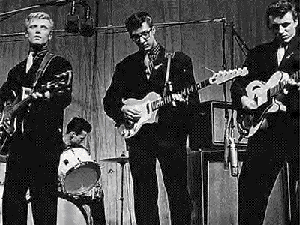
Chris Cutler, File Under Popular: Theoretical and Critical Writings on Music:
'The Shadows exemplified and perfected a form which was to have a far more profound effect on British Rock Music than the song form - this was the Instrumental. ...
In the Instrumental, ... it was, crucially, less the melody than the sound that mattered most. Each tune could have its own 'voice', using stopped or damped strings, echo, the termolo arm, tone filters, different pick-ups, different plectra, electric techniques for making quiet sounds very loud, and so on. For a long time the Instrumental was the field of discovery, and of most amateur group work; the instruments after all had to 'speak for themselves' - and their voices had to be discovered. It had the excitement of a Terra Nova.
Instrumental groups sprouted out of every classroom. The instruments were still easy, the form much more exciting and uncharted than Skiffle, and it was fun. And everybody complained about the noise you made rehearsing and horrible and cacophonous the music was - and if you were lucky you could get to play a wedding or a youth club or a hospital dance.
I have dwelt on this because it seems to me that it laid the foundation of so much to come that was uniquely British. After all, it was the beginning, it was where amongst young people in Britain, there emerged a generation of musicians of a new type. And it has always been glossed by pop historians and 'experts' as a mere tribituary. The internal dynamic was different. In Britain, it was here, in the Instrumental that the hegemony of the electric guitar was established as the voice of Rock music, here that many of the new forms appropriate to electric instruments were mapped, and here that the music was carried deep into non-black and non-American styles by excited, untrained, autodidact teenagers.'
June 16, 2004
FOR ALL THE LATEST EURO 2004 RANTS
E-2004 is now up and running.....
Just a reminder for those who want to post:
1. Go to http://www.blogger.com
2. Log in using the user name mark-k-punk and the password switch
3. Post away!
4. Remember to put your name at the bottom of the post so we can see who you are.
10 REASONS WHY MARCELLO SHOULDN'T GIVE UP
1. He's a voice. It's unmistakeable, isn't it, the Carlin-style?
2. Where else can you see Roger Whittaker and Dollar treated as serious reference points? (I'm not mocking; I love them both.)
3. MC's posts so often leaving you likcing your lips in anticipation. A friend of mine used to call Church of Me 'Church of I've Got to Have That'.
4. Even if Marcello's writing doesn't cure his own depression, it does wonders for mine.
5. Depth and breadth of knowledge plus lightness of touch. A winning combination.
6. Who else would have the good sense and good taste to point out that 'Total Eclipse of the Heart' is a brilliant record?
7. Rosie Vela.
8. The Joe Meek post invented a whole new genre. (First k-p alternate history of pop post to come some time soon.)
9. Even if 95% of music today is crap, 5% is still an awful lot of stuff to write about.
10. So much still to say. So many years still to cover.
EURO 2004 BLOG

To prevent k-p from being clogged up by Euro 2004 posts, and to allow them as wants to to ignore it, I've come up with a wheeze. I've set up a Euro 2004 blog on blogger as a space to discuss the tournament as it unfolds. It'd be great if other people joined in and posted - calling Scott and Phillip especially!
Anyway, it's called e-2004 and can be found here. If you want to post, simply go here.
I've started the ball rolling, so: all welcome.
ps If you're gonna post, remember to put your name at the bottom so we know who you are...
HAPPY BLOOMSDAY

"...I was a Flower of the mountain yes when I put the rose in my hair like the Andalusian girls used or shall I wear a red yes and how he kissed me under the Moorish wall and I thought well as well him as another and then I asked him with my eyes to ask again yes and then he asked me would I yes to say yes my mountain flower and first I put my arms around him yes and drew him down to me so he could feel my breasts all perfume yes and his heart was going like mad and yes I said yes I will Yes. "
June 15, 2004
I MUST GO ON

Land: 'Cyberpunk is too wired to concentrate...'
There's been a slightly valedictory air on the blogs of late, prompted by Matt's open-ended vacation, Marcello's announcement of yet another retirement (back soon, but, with any luck, not for the Glass Spider tour) and Simon's recent enforced absence.
Simon and Matt's semi-retirement has had its positive effects, if only to demonstrate the strength and tenacity of the network. I prefer the term 'network' to 'community' for a number of reasons. (The word 'community' always has a sinister, authoritarian taint for me. Have you noticed how it is always mobilized in the pathologically nebulous logic of differentiation at work in the mainstream news media? We hear about the 'black community', the 'gay community'; these groups, unlike 'us', the interpellated normative mass, always have 'leaders' and 'spokesman'. But that's another story...) Some, notably Marcello, have bristled at the notion that they are included in a community. But the very fact that it features hyperlinks (and is linked to) means that Naked Maja is a node in a network.
Simon was such a crucial lynchpin in the formation of the network, yet it's clear now that it is a genuine rhizome (for 'network' read 'rhizome'), no longer requiring a central focus or head. Simon's rep as a writer gave the network its initial 'charismatic seeding', drawing in readers-writers with disparate interests . An example: Oliver and Luka started reading k-punk because of links from Blissblog, both then started reading each other and became involved in the glorious heronbone-worldwarfour becoming that has been so fruitful over the past year.
John is right, naturally, to call for more distribution, less concentration. The internet was founded on this very principle (the military realising that its data network would be more robust if it was instantiated in multiple terminals). Yet I don't recognize the homogeneity John bemoans. All of the blogs I read are wonderfully idiosyncratic (Heronbone, Crumbling Loaf and Erase the World, to name but three, are absolutely unique, unlike anything to be found in print). I must admit, I don't spend much time reading 'review blogs'; what I want from blogs is best provided by those which exploit the form's capacity for digression. What I want from blogs is what I want from culture in general - vision, the co-ordinates for experiencing the world in a (re)newed way.
Also in respect of John's remarks, I think we need to be careful of Oedipalizing the relationship between blogs; of conceiving of certain blogs as 'fathers' whose influence needs to be violently overthrown (a la Harold Bloom's anxiety of influence thesis). The relationship is much more lateral. And in any case, there are new buds emerging on the rhizome all the time: the female philosophy offshoot comprised by Glueboot, Infinite Thought and And So It's Christmas is a particularly welcome new development, for instance.
The pro/amateur thing is a bit of a red herring in my view. There is the same distinction on the blogosphere as there is in the mainstream media: there are hacks and there are writers (just as in the academy, there are academics and intellectuals). The difference is not to do with whether you're remunerated for what you do, but whether you feel a genuine compulsion to produce it, if you experience an obligation to write that goes beyond simply having to pay the bills. One of the interesting things to come out of Marcello's otherwise unedifying hectoring of Dave in the World of Stelfox comments box was the clear message coming from both of them that they don't blog as some sort of compensation for 'failing' to be professional writers. As a matter of fact, both Dave and Marcello are professional writers, even if both also hold day jobs. It's clear, particularly in Marcello's case, that the only space that they can develop ideas at any length or with any idiosyncratic verve is on the internet. The print media is simply too crowded, too hidebound by all sorts of demographic and marketing pressures for anything of much cultural import to occur on it. While I make no bones that I would rather spend more time writing than teaching, what I feel for most music journalists, most of the time, is pity, not envy.
Of course, I still find myself checking prejudices in my assumptions about what counts as 'proper' writing. But what was once my default inclination to regard blog writing as secondary to work that is 'properly published', that has 'permanence', or is 'finished' is increasingly less insistent. The aphoristic, necessarily unfinished nature of the blog text is what separates it from the print form . I have to keep reminding myself of why the blog is called k-punk in the first place, and why Ccru spent so much time theorising the potential of cyberspace. We're living through exciting times, and blogs are part of that, one of the k(yber)-punk cultural developments. As I said in tribute to Luka last year:
"It's not supposed to 'fit together', to finally 'cohere', it's a (dis)assembly kit, it's writing in the aphoristic mode, writing as a part object, an object intrinsically hostile to wholeness, a series of holes in good sense, it's not One...
That way, it is left open...
... a directed outpouring from the unconscious, with its own rules, its own rhythms, its own singularity....
.... And this is what punk is ---- not amateurism, not destruction for its own sake ------ but systematic anti-professionalism ----"
Speaking for myself, for better or worse, I have to write.
So, no, I'm not ready to be torn apart by the primal horde yet. I'm sticking around, and I hope you are too.
REASONS TO BE THANKFUL TO UKIP
There are at least two reasons to be thankful to the UK Independence Party. The first, and most obvious, is that they have stymied the Tory revival under Michael Howard. But more importantly, they have split the Far Right vote, and in quite a significant way. The BNP have put all their resources into emphasising immigration. Immigration and asylum were the only issues mentioned on the charming BNP leaflets we had delivered to our flats (thankfully they were left in the lobby downstairs, so no prizes for guessing where they ended up). (btw, I wasn't sure whether to be amused or appalled at the BNP's claim that the government is planning FIVE CITIES the SIZE OF BIRMINGHAM to accomodate the MASSIVE INFLUX of asylum seekers.) The re-emergent UKIP, on the other hand, has emphasised sovereignty and EU corruption. Now this means that two issues that are usually conflated in the racist imaginary - immigration and sovereignty - have actually been separated. This can only be a positive thing.
REPHLEX, FENNESZ, GUTTERBREAKZ
Nick Gutterbreakz on Rephlex Grime --- and also Fennesz. In answer to Nick's question, no I haven't heard the new Fennesz album, nor anything much by him. Junior Boys' producer Matt Didemus gave heavy praise to Fennesz' Endless Summer when he was over in the UK recently. Sadly, this is only available on import, I think. But it's definitely on my wish list....
June 14, 2004
DESECRATED CULTURE (NO VALUES)
Land: "The infrastructure of power is human neurosoft compatible ROM. Authority instantiates itself as linear instruction pathways, genetic baboonery, scriptures, traditions, rituals, and gerontocratic hierarchies, resonant with the dominator ur-myth that the nature of reality has already been decided."
Further to our
For those not aware of the background, last week a Muslim group published a report identifying widespread Islamophobia within Britain. One of its recommendations was that there should be more Muslim schools.
Aarnovitch is right to be distrustful of the agenda behind this report. As he argues "an abuse of the term 'Islamophobic' is becoming a new weapon for attacking those who want to see a non-denominational, equal education system." Part of the problem is that the authors of the report have colluded in the racialization of Islam, in the equivocation of a religious affiliation with membership of a particular racial and or cultural group. In this, they duplicate the logic of the racist anti-immigrationists who worry that immigration must mean the (further) dilution - or in their terms, contamination - of British culture. The BNP likes to present itself as having no essential problem with other cultures. Both the Muslim lobby and the BNP could happily subscribe to that version of multiculturalism which wants cultures to be preserved in a their . The horror they share is of miscegenation, of cultural mixing and hybridization.
'Islamophobia' is an emotive term, and, again, Aaronvitch is right to be suspicious of the work that it is doing. There seems to be a surreptitious reversal of Voltaire's famous dictum, the credo of liberalism ('I disagree with what you say, but I would defend to the death your right to say it'), since the anti-Islamophobic lobby almost seem to be suggesting, 'If you don't agree with what I believe, you want me dead.'
But what is meant by 'Islamophobia'? If it means a persecution of individual Muslims, it is of course utterly deplorable and in every way indefensible. But if it means an opposition to a set of religious (and political) doctrines then it is not only acceptable, but, in my view, desirable - as desirable as opposing the autocracy of Roman Catholicism. These two things - a defence of individual Muslims and a hostility to Islamic doctrine - need to be kept apart. Such subtlety is, naturally, beyond the wit of foaming-at-the-mouth racists, but that is no justification for trading on their equivocation. Indeed, it is the most compelling reason for resisting such an equivocation.
There are very real reasons to oppose Islam. As Aaronvitch further argues, "What is going on here, I think, is an attempt to protect the young from modernity. ... It was argued by a pro-faith school columnist that at least the two great faiths - Catholicism and Islam - permit equality to believers and co-religionists. But they don't. If they did there would be women priests and women imams. My fear is that this emphasis on faith schooling is an attempt, albeit unconscious - to return us to the days before feminism, an attempt which affects all of us." Quite.
The relationship between Islam, Catholicism and patriarchy is not contingent but necessary. It is in the very nature of monotheistic religion. 'God the father' is not an accident of language which can be spirited away with a politically-correct rejigging of semantics. Monotheism is, in its very nature, a worship of gerontocratic male authority. This is one reason to be phobic about it.
Islamic absolutists have exploited an aporia in the philosophical logic underpinning multi-culturalism. This logic, cultural relativism, quickly leads to a paradox, in that it is forced to defend the very cultures which would totally reject the tolerance to which it is constitutively committed.
Some have responded to perceived cultural fragmentation by invoking mythical "core British values" to which new immigrants must swear alliegance. There are no such values. If anything defines British culture it is its lack of values. Britain was the first host of capitalism, and as such it was the first country to be literally desecrated, desacralised, by kapital. This desecration is to be celebrated, not reviled. Islamists share with the BNP a hostility to multi-national capitalism (it is not for nothing that al-Qaeda targeted the WTC, the symbol of global capital). Authoritarians of every stripe have known from the very beginning that capitalism is destructive of all ROM authority. That is what Deleuze and Guattari mean when they say that the primitive socius and the State do not 'precede' capitalism, since the virtual threat of capitalism, 'The Thing, the unnamable', is what produces the prohibitions and taboos which define them from the very beginning.
This is in no way to champion capitalism. Rather, it is to argue, with Deleuze and Guattari, that the "revolutionary path" is not to be found in mournful retrenchment, a projected "return" to pre-capitalist territorialities, but by forcing capitalism through to the "schizophrenic" limit it is always drawn towards but must always inhibit.
Kapital delivers the death of God. The ethical challenge it imposes is precisely the one that Nietzsche anticipated. We can either pretend that the fatality has not occurred and resurrect God and his authoritarian cults in new forms (Nietzsche saw this happening in what he called the 'modern values' of liberalism and the democratic movement) or we can face the radical desacralization of a universe in which we are 'falling, falling without limits'.
"A season in hell - how can it be separated from denunciation of European families, from the call for destructions that don't come quickly enough, ... from this prodigious migration, this becoming-woman, this becoming-Scandinavian or Mongol, this 'displacement of races and of continents,' this feeling of raw intensity that presides over delirium as well as over hallucination ans, and especially this deliberate, stubborn, material will to be 'of a race inferior for all eternity': [Rimbaud:] 'I have known every son of good birth, I have never been of this people, I have never been Christian, ... yes my eyes are closed to your light. I am a beast, a Negro." - Anti-Oedipus
OLIVER, BETTER THAN THE PAPERS AS EVER
Oliver comes up trumps again with a discussion of the House of Saud.
This more than ever reinforces my conviction that energy is a security issue. Energy has been kept peripheral to the mainstream political agenda by the perception that it is (merely?) an ethical matter, (and therefore) a luxury, not as immediately pressing as defence or economic issues. The American oil lobby, with Bush as their figurehead, have been of course happy to encourage this perception. Yet this is all short-termism, capitalism's most persistent vice. In thirty years, the oil will run dry. What then?
Also, I think opposition to the alliance with the Saudis is something else that Paul Wolfowitz has in his favour. My understanding was that Wolfowitz, along with a number of advisers to Bush Jr, have long warned about the dangers and the undesirability of cosying up to the House of Saud. It's the group surrounding Bush Sr who favour a continued alliance with the corrupt dynasty.
btw an entreaty, in the vain hope that someone in the mainstream media is out there capable of acting upon it: someone please employ Oliver as a columnist. Look at these piece: like all of his political writing, it's spectacularly well-informed and researched, eloquentlly and eruditely written, and advocates a unique opinion. All of this while he works full-time in a fucking bookshop!
June 13, 2004
A CRUEL AND STUPID LIZARD
Hitchens: 'I only saw him once up close, which happened to be when he got a question he didn't like. Was it true that his staff in the 1980 debates had stolen President Carter's briefing book? (They had.) The famously genial grin turned into a rictus of senile fury: I was looking at a cruel and stupid lizard. His reply was that maybe his staff had, and maybe they hadn't, but what about the leak of the Pentagon Papers? Thus, a secret theft of presidential documents was equated with the public disclosure of needful information. This was a man never short of a cheap jibe or the sort of falsehood that would, however laughable, buy him some time.'
WHY I WANT TO FUCK RONALD REAGAN

'At the 1980 Republican Convention in San Francisco, pranksters reproduced and distributed the section of The Atrocity Exhibition called “Why I want to Fuck Ronald Reagan”, without the title and adorned with the Republican Party seal. “I’m told,” Ballard reports, “that it was accepted for what it resembled, a psychological position paper on the candidate’s subliminal appeal, commissioned from some maverick think tank.”
What does this neo-Dadaist act of would-be subversion tell us? In one sense, it has to be hailed as the perfect act of subversion. But, viewed another way, it shows that subversion is impossible now. The fate of a whole tradition of ludic intervention - passing from the Dadaists into the Surrealists and the Situationists - seems to hang in the balance. Where once the Dadaists and their inheritors could dream of invading the stage, disrupting what Burroughs - still very obviously a part of this heritage - calls the “reality studio” with logic bombs, now there is no stage - no scene, Baudrillard would say - to invade. For two reasons: first, because the frontier zones of hypercapital do not try to repress so much as absorb the irrational and the illogical, and, second, because the distinction between stage and offstage has been superceded by a coolly inclusive loop of fiction: Reagan’s career outstrips any attempt to ludically lampoon it, and demonstrates the increasingly pliability of the boundaries between the real and its simulations. For Baudrillard, the very attacks on “reality” mounted by groups such as the Surrealists function to keep the real alive (by providing it with a fabulous, dream world, ostensibly entirely alternative to but in effect dialectically complicit with the everyday world of the real) . “Surrealism was still in solidarity with the real it contested, but which it doubled and ruptured in the imaginary.” In conditions of third (and fourth-order) simulacra, the giddy vertigo of hyperreality banalizes a coolly hallucinogenic ambience, absorbing all reality into simulation. Fiction is everywhere - and therefore, in a certain sense, eliminated as a specific category. Where once Reagan’s own role as actor-president seemed “novel”, his subsequent career, in which moments from film history become montaged - in Reagan’s own hazy memory and in media accounts - with Reagan’s role in particular movies. The ludic becomes the ludicrous.
The apparent acceptance, by the Republican delegates, of the genuineness of the “Why I Want to Fuck Ronald Reagan” text, is both shocking and oddly predictable, and both responses are in fact a testament to the power of Ballard’s fictions, which resides no more in their ability to mimetically reflect a pre-existing social reality than it does in their capacity to imaginatively overturn it. What Ballard achieves, rather, is what Iain Hamilton-Grant calls “realism about the hyperreal”, a homeopatic participation in the media-cybernetization of reality in late capitalism. The shock comes when we remind ourselves of (what would seem to be) the radical abberance of Ballard’s material. “Why I Want to Fuck Ronald Reagan”, like many of the sections of The Atrocity Exhibition, particularly in the latter part of the novel, is presented as a report on experiments into audience responses to prepared media stimuli.
Ronald Reagan and the conceptual auto-disaster. Numerous studies have been conducted upon patients in terminal paresis (G.P.I.), placing Reagan in a series of simulated auto-crashes, e.g. multiple pile-ups, head on collisions, motorcade attacks (fantasies of Presidential assassinations remained a continuing preoccupation, subjects showing a marked polymorphic fixation on windshields an rear-trunk assemblies). Powerful erotic fantasies of an anal-sadistic character surrounded the image of the Presidential contender.
But this shock is counterposed by a sense of predictability arising from the cool elegance of Ballard’s simulations. The technical tone of Ballard’s writing - its impersonality and lack of emotional inflection - perform the function of neutralizing or normalizing the ostensibly unacceptable material. Is this simulation of the operations of Hypercontrol agencies a satire on them, or do their activities - and the whole cultural scene of which they are a part - render satire as such impossible now? What, after all, is the relationship between satire and simulation? To begin to answer that question we need to compare Ballard’s text with other, more definitively “satirical” texts. Before that, though, we need to bear in mind Jameson’s comments on the eclipse of parody by pastiche, which we shall examine, briefly, now.
This is not the place to interrogate the differences between parody and satire; we shall proceed on the assumption that, whatever differences there are between parody and satire, they share enough in common so as to be jointly subject to Jameson’s analyses. Parody, Jameson argues, depended upon a whole set of resources available to modernism but which have faded now: the individual subject, whose “inimitable” idosyncratic style, Jameson wryly observes, could precisely gave rise to imitations; a strong historical sense, which has its necessary obverse a confidence that there is a genuinely contemporary means of expression; and a commitment to collective projects, which could motivate writing and give it a political purpose. As these disappear, Jameson suggests, so does the space of parody. Individual style gives way to a “field of stylistic and discursive heterogeneity without a norm”, just as the belief in progress and the faith that one could describe new times in new terms wanes, to be replaced by “the imitation of dead styles, speech through all the masks and voices stored up in the imaginary museums of a new global culture”. Late capitalism’s “postliteracy”, meanwhile, points to “the absence of any great collective project.” What results, according to Jameson, is a depthless experience, in which the past is everywhere at the same time as the historical sense fades; we have a “society bereft of all historicity” that is simultaneously unable to present anything that is not a reheated version of the past. Pastiche displaces parody:
In this situation, parody finds itself without a vocation; it has lived, and that strange new thing pastiche comes to take its place. Pastiche is, like parody, the imitation of a peculiar or unique, idiosyncratic style, the wearing of a linguistic mask, speech in a dead language. But it is a neutral practice of such mimicry, without any of parody’s ulterior motives, amputated of the satiric impulse, devoid of laughter and of any conviction that alongside the abnormal tongue you have momentarily borrowed, some healthy linguistic normality still exists. Pastiche is thus blank parody, a statue with blind eyeballs [...]
Despite what Jameson himself writes on Ballard, one of the important difference between the Ballard text and pastiche as Jameson describes it is the absence of “nostalgia” or the “nostalgia mode” - an insistent presence in other postmodernist science fiction texts, as Jameson shows- in Ballard’s work. Indeed, Ballard’s commitment to striking textual innovations - as evidenced in the layout of the pages themselves in The Atrocity Exhibition - mark him as something of an anomaly in Jameson’s terms; in this sense, at least, Ballard seems to be continuous with modernism as Jameson understands it. Yet in certain other respects - specifically, in terms of the collapse of individual subjectivity and the failure of collective political action - Ballard is emblematic of Jameson’s postmodernity. But, unlike Jameson’s pastiche, Ballard does not imitate “a peculiar or unique idiosyncratic style.” The style that Ballard simulates in “Why I Want to Fuck Ronald Reagan” - a style towards which the whole of The Atrocity Exhibition tends - is precisely lacking in any personality: if there any idiosyncracies, they belong to the tehnical register of (pseudo)scienfitic reportage, not to the characteristics of an individual subject. The fact that the text concerns a political leader draws attention to the lack of any explicit - or, more importantly when discussing satire or pardody, implicit - political teleology in Ballard’s writing. It is in this sense that “Why I Want to Fuck Ronald Reagan”, like Jameson’s pastiche, is “without any of parody’s ulterior motives.”
Certainly, this is one way in which “Why I Want to Fuck Ronald Reagan” differs greatly from a classical work of satire such as Swift’s Modest Proposal. A Modest Proposal is a paradigmatic work of what Joyce called “kinetic” art, produced in particular political and cultural circumstances with a particular aim, to sway an audience into action. Swift’s political purpose - his disparaging of the cruelty of certain English responses to the Irish potato famine - is marked by a certain stylistic and thematic excess (an excess that famously bypassed altogether certain of Swift’s readers, who were able to take the text at face value), whereas Ballard’s text - which emerged, no less than Swift’s, from a very particular sociocultural situation - can be defined by its flatness. This marks a move on, (even) from Burroughs. For all their linguistic inventiveness, Burroughs’ humorous “routines” such as “The All-American Deanxietized Man” remain in a classical tradition of satire through their use of exaggeration and their clear political agenda: using a series of excessive tropes, Burroughs mocks the amoral mores of American technoscience. By contrast, what Ballard’s text “lacks” is any clear designs on the reader, any of Jameson’s “ulterior motives”; the parodic text always gave central importance to the parodist behind it, his implicit but flagged attitudes and opinions, but “Why I Want to Fuck Ronald Reagan” is as coldly anonymous as the texts it imitates. Whereas we hear Burroughs’ cackling at the absurb excesses of the scientists in “The All-American Deanxietized Man”, the response of Ballard to the scientists whose work he simulates is unreadable. What does “Ballard” want the reader to feel: disgust? amusement? It is unclear, and, as Baudrillard argues in relation to Crash, it is somewhat disingenuous of Ballard the author to overcode his texts - in prefatory authorial remarks - with all the traditional baggage of “warning” that they themselves clearly elude. The mode Ballard adopts in “Why I Want to Fuck Ronald Reagan” is not that of (satirical) exaggeration, but is a kind of (simulated) extrapolation. The very genre of the poll or the survey, as Baudrillard shows, makes the question unanswerable, undecidable.
Despite what Ballard himself suggests, (see above), what matters is less the (possible) resemblance of “Why I Want to Fuck Ronald Reagan” to (possible) reports than the circulation of simulation to which such reports already contribute. Writing on pastiche, Jameson comes upon the concept of simulation, but attributes it to Plato rather than referring - here at least - to Baudrillard’s reinvention of it. Yet Jameson’s intuition about the relationship between pastiche and simulation is important. We could perhaps suggest a correlation between Baudrillard’s third order simulacra and Jameson’s pastiche, on the one hand, and Ballard’s text on the other. What simulation in Baudrillard’s third-order sense entails is, as we have repeatedly insisted, the collapse of distance between the simulation and what is simulates. Satire, in its classical sense, we would probably want to locate as part of “First-order simulacra” - a simulation that resembles the original, but with certain tell-tale differences. Ballard simulates the simulation (the poll, the survey).'
Flatline Constructs, Chapter Four.
THE GREAT COMMUNICATOR

'[W]hat is astonishing is that Reagan wasn't laughed and jeered off the campaign podium, and was swept into office, not once but twice. It wasn't that people didn't hear his verbal fumbling or recognize the incoherence of his thoughts. They were the butt of constant jokes and news stories. And it wasn't that what they lacked on the the level of verbal coherence was glossed over by the seductive fluency of his body image. Reagan was more famous for his polyps than his poise, and there was a collective fascination with his faltering health and regular shedding of bits and pieces of himself. The only conclusion is that Reagan was an effective leader not in spite of but because of his double dysfunction. He was able to produce ideological effects by non-ideological means, a global shift in the political direction of the United States by falling apart. His means were affective.
... Reagan operationalized the virtual in postmodern politics. Alone, he was nothing approaching an ideologue. He was nothing, an idiocy musically coupled with an incoherence. But, that's a bit unfair. He was an incipience. He was unqualified and without content. But, his incipience was prolonged by technologies of image transmission and then relayed by apparatuses such as the family or the church or the school or the chamber of commerce, which in conjunction with the media acted as part of the nervous system of a new and frightening body politic. It was on the receiving end end that the Reagan incipience was qualified, given content. Receiving apparatuses fulfilled the inhibitory, limitative function. They selected one line of movement, one progression of meaning, to actualize and implant locally. That is why Reagan could be so many things to so many people; that is why the majority of the electorate could disagree with him on major issues but still vote for him. Becausehe was actualized, in their neighbourhood, as a movement and meaning of their selection - or at least selected for them with their acquiescence. He was man for all inhibitions.'
STAND UP, NIGEL BARTON

I remember, I remember
The school where I was born;
I remember, I remember,
The school where I was ..... torn.
Nietzsche:
'And nowadays what else does education and culture want! In our age of the people—I mean our uncouth age—“education” and “culture” must basically be the art of deception, to mislead about the origin of the inherited rabble in one’s body and soul.'
Dennis Potter's Stand Up, Nigel Barton, shown as part of BBC 4's Summer of the Sixties season, is still almost too painful to watch.
Here is Potter writing a television play which draws very closely upon his experiences as a scholarship boy, projected out of his class into the rarefied world of Oxford. 'Stand Up, Nigel Barton' was actually written after 'Vote, Vote, Vote for Nigel Barton', Potter's fictionalized account of his failed attempt to become elected as a Labour MP. To Potter's disgust, 'Vote, Vote, Vote' was suppressed by the BBC, but its temporary banning allowed him to work again with the characters he had invented, writing this prequel which would be shown first.
English fiction has always been ambivalent about social mobility. Potter's theme was very much one with which the sixties would be preoccupied, in music as much as drama. Condider the Kinks ('Rosy, won't you please come home', 'See my friends/ they cross the river') or the Who ('I was born with a plastic spoon in my mouth'). Like Dickens' Pip, Nigel is profoundly torn; unwilling to give up the privilege and status he has newly acquired, unable to accept and enjoy them as one to the manner born, simultaneously holding onto his roots and repudiating them, never forgetting where he has come from, but ashamed of the stains that his origins have left upon him. And ashamed of that shame. Never comfortable amongst the masters, but no longer at home in the community which produced him.
Forty years on, and the screen still crackles with rage, confusion and embarrassment. Potter intercuts between the working men's club, bedrock of the proletarian community, with its 'suffocating affection' but deep suspicion, resentment and distrust of those who leave; and the smug redoubt of the Oxford Union, whose louche members idly trade bon mots ('Oxford,' as Nigel observes in his somewhat too histrionic style, 'where nothing really matters', where a dissolute, ironic detachment is the mark of a gentleman, and where Nigel's very passion marks him out as not quite right.)
Who can watch the final scene - Nigel at home with his parents, watching himself being interviewed on television about class - without cringing? What Nigel says about his father 'watching him like a hawk', about 'walking a tightrope', about class only being experienced by those who move between classes; none of this is a distortion. And yet, Nigel is too much in love with his own cleverness, too much attached to the role of alienated working class boy that he has been invited to play. He knows he has betrayed his parents. His father, ambivalent about him at the best of times, both proud and resentful, simmers; his mother, uncomprehending, weeps 'But it's clean. You could eat off the floor here...'
Potter shows that he can do naturalism painfully and powerfully. But he's already exploring more expressionistic techniques: playing with chronology, breaking the frame (adults playing children, characters speaking directly to camera). The origin of the famous classroom scene in The Singing Detective is here, with Janet Henfrey taking on the role of the terrifyingly inquisitorial, witch-like schoolmistress she will reprise in the later play. The performances, especially Keith Barron as Nigel and Jack Woolgar as his father, are universally superb.
No need to reiterate, by now, my lament for TV drama this challenging, this near-the-knuckle, this relevant. But what a nihilistic message Potter conveys. There is nothing to aspire to, nothing you'd want to return to. Nigel trapped and alone, forever alone...
"With Stand Up, Nigel Barton I knew that in small family groupings - that is, at their most vulnerable - both coalminers and Oxford dons would probably see the play. This could add enormously to the potency of a story which attempted to use the specially English embarrassment about class in a deliberately embarrassing series of confrontations. In the theatre - or, at least, in the West End - the audience would have been largely only on one side of this particular fence. There is no other medium which could virtually guarantee an audience of millions with a full quota of manual workers and stockbrokers for a 'serious' play about class."
June 12, 2004
June 11, 2004
DATE OF LAST POSTS
Heronbone: May 24 (excuse note accepted, in NZ)
Woebot: May 13 (leave period officially OVER: expected back online forthwith)
Blissblog: May 16 (needs new medical certificate; how's the thumb Simon?)
House at World's End: May 08 (erratic as ever)
Pillbox: March 27 (extended truanting; just not good enough)
Messrs Ingram and Reynolds should note that it is very nearly a MONTH since they last showed their faces.
June 10, 2004
SHE'S NOT MY MOTHER
Cronenberg's Spider - warning: contains spoilers
Interviewer: It's hard to see this movie and not consider that all our memories are creations.
Cronenberg: But they are, they totally are.
Joy Division: Watch from the wings as the scenes were replaying
We saw ourselves now as we never had seen…
Cronenberg’s Spider - adapted from Patrick McGrath’s superb novel – is a study of schizophrenia that couldn’t be further removed from the clichéd image of ‘madness’ in cinema. There are numerous examples of this, but the one that comes immediately to mind (perhaps because I watched it recently) is Windom Earl in the second season of Twin Peaks: gibbering, histrionic, megalomaniac. Think also of Nicholson’s Joker in the first Batman movie. Madness is here imaged as a kind of absurdly inflated ego; a self that knows no bounds, which wants to expand itself infinitely. As played by Ralph Fiennes in Cronenberg’s film, Spider, too, has a precarious sense of his own limits, but, far from wanting to spread further into the world, he seems to want to make himself disappear. Everything about him – his mumbling speech, shambling movements and - screams withdrawal, retreat, terror of the outside. That’s because, as ever in Cronenberg’s schizoverse, the outside is already inside. And the reverse.
McGrath’s novel is set entirely within the head of its archetypal unreliable narrator, Spider, since it is written as a series of diary entries. To simulate this, Cronenberg could have gone with the strategy employed in the early versions of the script and used voiceover (although anyone who’s seen Spike Jonze’s Adaptation will remember ‘Robert Mckee’s’ rant about that particular technique). In the end, Cronenberg strips out Spider’s narrative voice altogether, with the result that the film is, in a strange way, truer to the novel than the novel itself. In the novel, Spider’s articulacy gives him a kind of self-awareness and (albeit limited) transcendence of his mania. In the film, there is no distance, no narrative voice, only a ceaselessly productive narrative machine, chattering out multiple permutations. In place of the transcendent offscreen voice, we are presented with Spider as a character in his own delirium, the adult version of himself observing and writing, always writing, as the memories of his childhood life play out. As Cronenberg has observed, it is almost as if Spider is directing his own memories. ‘One journalist said to me, "When we see Spider in his own memories, peeking in the windows or hiding in the corner, isn't that like a director being on the set?" I hadn't thought of it that way, but he is redirecting and rechoreographing his memories.’ We are reminded that the dreamer is every character in his dream.
So Spider develops a naturalistic expressionism, or expressionist naturalism. Its strangely solitary London is, Cronenberg says, an expressionist London. Spider captures the boiled potatoes atmosphere of the pre-rock ‘n’ roll Fifties, its muted colours as washed out as cabbage water.
The film of Cronenberg’s which Spider most resembles is Naked Lunch; not only because it, too, is based upon a supposedly unadaptable book, but also because both films principally concern writing, insanity, masculinity and the death of a woman. In both Naked Lunch and Spider, the phantasmatically reiterated murder of a woman is the pivotal event, the lacuna around which the films circle. In Naked Lunch, Lee initially disavows the killing of his wife Joan by attributing it to the influence of Control. Lee is only able to accept minimal responsibility for the killing when he is ‘required’, at the end of the film, to assassinate Joan, or at least her double, again. The re-staging of the death is less an admission of ethical responsibility than an attempt to own it, to make sense of it. Such is the logic of trauma. (Reminding us of Ballard’s description of the motives of the schizo in The Atrocity Exhibition: ‘He wanted to kill Kennedy again, but this time in a way that made sense.’)
In Spider we are initially led to believe that Spider’s father, Bill Cleg (Horace in the novel) has killed Spider’s mother after embarking on an affair with the ‘fat tart’ Yvonne (Hilda in the novel). No sooner has Bill brutally and casually murdered his wife, rolling her into a hastily dug grave in the earth of his allotment (‘out with the old,’ Yvonne callously cackles), than he moves Yvonne into his home. At this point, our suspicions that something is amiss with Spider’s narration begins to harden into a conviction. But it’s only at the end of the film that we learn what appears to have really happened: it is Spider himself who killed his mother, gassing her whilst apparently suffering from a delusion that she is another person. The early exchanges between Spider and his father take on a different significance (Spider: ‘She’s not my mother.’ Bill: ‘Well, who is she then?’) The final scene sees Bill rescuing Spider from the house, and desperately trying to revive Yvonne, who in death, has become, once again, the dark-haired Mrs Cleg.
While this seems to be the preferred interpretation, the film does not close down any of the narrative possibilities it has opened up . I think we can enumerate nine distinct narrative options that the film leaves open:
Rather than resolving the ambiguities of McGrath’s novel, the film actually amplifies them. In the novel, we at least learn (it seems) that Spider has been incarcerated for killing his mother (even though he continues to maintain that it was his father who was responsible for the death). In the film, the twenty years between Mrs Cleg’s death and Spider’s arrival at the halfway house are a blank. We know, or think we know, by inference, that he has been in a psychiatric institution, but no more.
Miranda Richardson’s performance is crucial to the maintenance of the film’s polysemous ambiguity. She is superb in three different roles: as the virtuous brunette Mrs Cleg, the licentious blonde Yvonne and also as the suddenly and inappropriately sexually aggressive landlady of the halfway house, Mrs Wilkinson. The situation is complicated by the fact that Yvonne is played at first by another actress altogether (at least, I think that is the case; it is a tribute to the film’s queasy delirium and to Richardon’s performance, that I’m just not sure), just as Mrs Wilkinson is played for most of the film by Lynne Redgrave.
As in Naked Lunch, writing is both passive and active. Like Bill Lee, Spider, scratching away in his notebook in his idiolectic hieroglyphics, seems at one level only to be recording signal from outside; at another level, he is the producer of the whole scene, its delirealiser.

Talking about the film, Cronenberg has referred to Nabokov’s theory of memory and art as attempts to recover the unrecoverable. But the figure that dominates the film is another writer who, like Nabokov, Brian McHale has referred to as a ‘limit-modernist’, Samuel Beckett. Cronenberg has said that Spider’s look, with its shock of spiky hair, was very much influenced by photographs of Beckett, but the affinity with Beckett goes much deeper. Like Molloy or Malone, Spider is continually fumbling in his pockets for talismanic objects. Such partial objects mark the routes on their ‘intensive voyages’. Like McGrath, Cronenberg seduces us into identification with Spider (Cronenberg: 'I am Spider'), taking us with him on his schizo-stroll, then strands us in the delirium...
My review of the Rephlex Grime LP is now up on Stylus. (K-p readers may notice some uh recycled elements from the blog, but if you've said what you wanted to say first time round, why change, eh?)
RUBBISH COVER VERSIONS
Which one is worse, do you think?
The Phixx Mike Yarwooding of 'Wild Boys' (if it's on in the background, you can forget for a moment that it's not DD; everything, everything is the same, the arrangement, the vocals...)
Whoever it is who's done 'Alright Now'... What exactly is the point in this?
Back with more stuff

The recarnivalization of the postmodern? Chuck Barris, Charlie Kaufman and punk-junk TV.
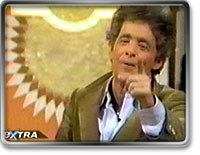
For better or worse, Chuck Barris is the anarchitect of some of our most controversial contemporary popculture.
For non-American readers or British readers who didn’t watch teatime Channel 4 during the eighties, a word of explanation is required.
Barris was a TV producer who dreamt up ‘The Dating Game’ (which would become ‘Mr and Mrs’ in Britain), ‘The Newlywed Game’ (UK version: ‘Blind Date’) and, most notoriously of all, ‘The Gong Show’ (forerunner of reconditioned talent show such as ‘Pop Idol’ and of reality TV).
(A British triumvurate from TV Hell: Derek Batey – Cilla Black – Ant ‘n’ Dec.)
‘The Gong Show’ was like the first week of Pop Idol, forever: all the abjects, braggarts, borderline psychotics, terminally self-deluded maniacs and kookoos, not as the prelude to the main act, but as the principal attraction. It was a non-talent show, in which a parade of no-hopers would be given a taste of exposure on coast-to-coast TV. They were allowed 45 seconds to present their act unmolested; after that, they could be gonged by the celebrity panel, in which case they would be removed from the stage with as little ceremony as possible. Those that survived would be awarded a mark out of ten by the panel .
In fact, it’s only on the most superficial level that‘The Gong Show’ anticipated ‘Pop Idol’. ‘Pop Idol’ polices a rigorously-enforced reality principle which assumes that what is possible and what is valuable are fixed and determined for all time (what it must repress is the ability of hype-mechanics to melt all certainties, to machine new potentials; the reality principle is predicated upon the denial of the fact that reality is not governed by principles of any kind). ‘The Gong Show’ was a carnivalesque detournement, a riotous kingdom of misrule in which traditional values were inverted and ridiculed; the few genuinely talented acts represented a worthy competence that could not but appear paltry next to the demented exuberance of the freaks. By contrast, ‘Pop Idol’ unproblematically hawks the dominant managerialist values of ‘success’, the achievement of which, we are assured, requires conformity to an pre-determined (and pop-demographically reinforced) profile. And while ‘Pop Idol’ acts as an organ of the mainstream Entertainment and Music industries, Barris fought a running battle with the ‘veeps’ in control of corporate television.
He was almost certainly the first to grasp the two premises on which today’s reality TV operates: (1) ‘ordinary’ people will do anything to get on television; and (2) those same ordinary people can be more entertaining than professionals.
There’s a whole thesis to be written about how the very same features which Bakhtin defines as characteristic of the carnivalesque – ‘festive pleasure, the world turned topsy-turvy, destruction and creation… extravagant juxtapositions, the grotesque mixing and confrontations of high and low, upper-class and lower-class, spiritual and material, young and old, male and female, daily identity and festive mask, serious conventions and their parodies’.– became neutered and conservative when redeployed by PoMo. In PoMo, the complement of ‘irreverence’ is always cynicism. But there was no self-satisfied irony in ‘The Gong Show’. And that was due in no small part to Barris’ personality.
Barris was at the heart of ‘The Gong Show’. He didn’t only conceive the programme, he presented it too, after both he and the studio agreed that the standard smarmy lunkhead gameshow host they’d lined up would be way too literal-minded to make the concept fly. Shabby, ludic and inept, Barris nevertheless radiated a charming, irrepressible joy. Barris, the Prince of Fools, was simply too conspicuously incompetent, too weird, to smugly pass judgement on the acts. (This is another way in which ‘The Gong Show’ was much more subversive than reality TV now; instead of the smirking Ant ‘n’ Dec or the maternal Davina McCall acting as representatives of the Norm, here was Barris, at least as weird as any of the contestants, a Bizarro where Normality should be.) If Barris’ persona was reminiscent of anything it was the shambolic saintliness and hobo vitality of Peter Falk’s Columbo (the only redeeming feature of Wenders’ portentous and facile Wings of Desire was its perspicacious casting of Falk as an angel).
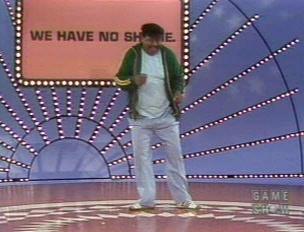
Barris surrounded himself with a motley gang of grotesques, eccentrics and fellow lovers of the absurd; the judging panel regulars – louche Village Voice toff Rex Reed; suggestive siren Jaye P. Morgan and ‘zany’ Jamie Farr (from ‘M*A*S*H*) - but most importantly his own crew of never-even-wanted-to-be’s, such as Gene Gene the Dancing Machine (a pathetically inadequate but enthusiastic and winningly idiosyncratic dancer, plucked like, many of Chuck’s entourage, and to the chagrin of the studio, from the ranks of the stagehands), and the Unknown Comic, a wisecracking invective-machine with a paper bag pulled over his head.
Typical exchange between Barris and the Unknown Comic:
Unknown Comic: ‘What’s the difference between toilet paper and a shower curtain?’
Barris: ‘I don’t know.’
Unknown Comic: ‘HERE’S the guy.’
Barris came back into prominence recently, of course, because of the 2002 movie Confessions of a Dangerous Mind directed by George Clooney and adapted by Charlie Kaufman from Barris’ own ‘unauthorised autobiography’. Now there’s a phrase. ‘Unauthorised autobiography’: what could that mean?
The answer is an alternately hilarious, tragic and gripping account of Barris’ numerous rises and falls through television, intercut with an allegedly no less autobiographical account of his shadowy secret life as a CIA operative. Barris’ straightfaced, almost seamless interpolation of the dubious ‘CIA’ narrative into the body of his accepted life story draws the autobiography genre into complicity with the spy thriller. (Clooney echoed this strategy in the film, saying that although he had a view on the veracity of the CIA story, the film would have been weakened if he had shared it.) What results is an appropriately bizarre hyperfiction whose intent may be satirical – posing the question, why was the public Barris condemned as ‘an enemy of civilization’ simply for entertaining people, whereas the CIA Barris was decorated for killing them? – but which is too ontologically unstable to bear any readily assimilable message.
Barris scrupulously observes the conventions of both the autobiography (anecdotes, humorous self-deprecation, sexual revelations) and the spy genre (detailed description of weapons, a subplot involving the discovery of a mole), subverting both. What falls away is any notion of an uncontested, final, authorized reality. No word is final. Even – no especially – autobiographies are to be distrusted, especially when they tell the truth. ‘The aspiration of carnival is to uncover, undermine - even destroy, the hegemony of any ideology that seeks to have the final word about the world, and also to renew, to shed light upon life, the meanings it harbours, to elucidate potentials; projecting, as it does an alternate conceptualisation of reality.’

As you’d expect, Charlie Kaufman would seem to be the perfect screenwriter for so hyperfictionally twisted a story . Kaufman has made an art out of the interzone between fiction, celebrity and biography, fictionalizing the lives of John Malkovich (in Being John Malkovich and the author Susan Orlean (in Adaptation). Tensions between Clooney and Kaufman notwithstanding - Clooney apparently rewrote some of the third act – Kaufman brings his kooky PKD sensibility to bear once again. Look at the concept – a semi-gone-to-seed TV executive-cum-presenter who doubles as a CIA agent. It’s pure Philip K! There’s a wonderful scene that isn’t in Barris’ book wherein the sweaty, wired, paranoid Barris – barely holding it together beneath ‘The Gong Show’’s bright lights – confronts the masked Unknown Comic, demanding to know who he is, waving a gun at his head. (You can read Kaufman’s script here on what is an astonishingly comprehensive Kaufman site.) (Confirmation once more that it’s Kaufman, not whatever sad case they’ve got to do it, who would be the perfect adapter of Dick’s Through A Glass Darkly.)
Kaufman, like his collaborator Spike Jonze, strikes me as an ambiguous figure. Is he a purveyor of mise-en-abysmal PoMo meta-reference, or, like Barris, an agent of the recarnivalization of the postmodern?
It’s been said that, what the Beatles did for music, Barris did for television. But a better comparison would be punk. In the same period that the Pistols were blowing holes in the Reality principle in Britain (‘rip in the master film!’ as Burroughs put it), Barris was introducing anarchy to US TV.
For a brief while, the carnival was in town.
‘Because of their obvious sensuous character and their strong element of play, carnival images closely resemble certain artistic forms, namely the spectacle. In turn, medieval spectacles often tended toward carnival folk culture, the culture of the marketplace, and to a certain extent became one of its components. But the basic carnival nucleus of this culture is by no means a purely artistic form nor a spectacle and does not, generally speaking, belong to the sphere of art. It belongs to the borderline between art and life. In reality, it is life itself, but shaped according to a certain pattern of play.
In fact, carnival does not know footlights, in the sense that it does not acknowledge any distinction between actors and spectators. Footlights would destroy a carnival, as the absence of footlights would destroy a theatrical performance. Carnival is not a spectacle seen by the people; they live in it, and everyone participates because its very idea embraces all people. While carnival lasts, there is no other life outside it. During carnival time life is subject only to its own laws, that is, the laws of its own freedom.’
Bakhtin, Rabelais and his World
June 09, 2004
If anyone's tried to email via the k-punk account, I haven't been able to receive mail through it for the past few days. God only knows why. So apologies; I haven't been ignoring you, honest.
June 08, 2004
IN THE MEANTIME
The big posts are on the way, I promise. For now, some more recommendations:
Highly interesting blog by someone called Richard Doyle, a US academic whose interests - in biology, postmodern capital and pschedelics - dovetail somewhat with those of the Ccru (especially Luciana's). He also has tons of fascinatingly evolving texts up as 'wikis' (I'll level with you I don't really understand what wikis are at all), the most recent of which can be accessed here.
And So This Is Christmas blog - looks like it's a bit similar to the excellent Glueboot; lots of musing on popculture and philosophy.... Should be encouraged to update more, by the looks ot it.
This piece critiquing Hardt and Negri's Empire (link courtesy of H.U.H.) raises many pertinent and highly topical points. Might write more about this later.
Special request: does anyone out there have a copy of Walter Cannon's essay 'Voodoo Death'? It's one of my favourite things, but I can't for the life of me locate my copy...
June 07, 2004
I'm almost hoping England don't do so well if it means having to endure the worthy plod of The Farm yet again. The Farm were nearly as facile, fatuous and devoid-of-funk as Faithless.
Nearly.
I'M STICKING MY NECK OUT
Three predictions about the European Championship:
France won't win it.
England won't lose to France.
Spain will do nothing. (This last one the easiest, if only I had a tenner for every time someone has written, 'It's true that Spain have done nothing in any tournament ever, for as long as football has existed, but this time...')
MORE ON THE BRITPOP/ BRITART INTERFACE
As if to confirm Dave's observations : coincidentally came upon Chris Roberts' hilarious demolition of the Britpop album Live Forever (and what a pathetically ironic title that is) from Uncut last year (opening line, 'If you can rememeber the '90s, you had mediocre taste in music'), which concludes: 'The woeful Oasis and the meat-and-spuds Manics are only topped for triteness by the risible Robbie Williams. The cheeky chappy gang's all here - perhaps someone else whose feebleness will be chuckled at within two years, like Hirst or Emin, could be given a hundred grand of our taxes to enbalm them. They moved nothing or no-one. We've moved on.'
June 04, 2004
COMING UP....
Don't think I'll have much time to post over the weekend, but, never fear, mega-posts coming up very soon on Cronenberg's Spider, Kaufman and Clooney's Confessions of a Dangerous Mind, Fleetwood Mac, and iconoclasm....
And, readers, notice how good I've been. Not one single mention of B.. B....... (despite it being the most promising - that is to say, the most exploitative and unpleasant - series so far). For words of wisdom on this, look no further than the Loaf...
ALL STYLES SERVED HERE
Marcello confirming once again, if there was any doubt about it, and in spite of everything else, what a good writer he is. (Not sure I agree with the idea that 'an Eng Lit student of Fitzwilliam' couldn't make a spelling mistake, however.)
June 02, 2004
UNITED IN POPTIMISM
OMG.
'Debbie Harry doing 'Strict Machine' in the Tardis.'
That's how Popjustice describes the new Rachel Stevens single.
And it's produced by Richard X.
How good does that sound?
ALSO
Baal in characteristically intense form, with a Baconesque description of sweltering Glasgow....
CURRENTLY ON THE BLOGS
Here's a first: a link to a blog with no content on it as of yet. Brian Dillon's Laughter, Tears and Rage promises to be excellent if it lives up to the promise of the published writings hyperlinked on the sidebar. Lotsa excellent stuff on Badiou, aphorisms, repetition, Bataille... (Brian has also provided a beautifully eloquent comment to the 'Goebbels' post below.)
Dave Stelfox with a couple of bang-on posts; one uses the Momart fire as a jumping off point for a consideration of the differences/ convergences between pop and visual art, i.e. when you see a Mondrian, what song do you hear?; the other is a hymn in praise of the latest Girls Aloud mistresspiece... (Look in Tom's comments boxes btw for a link to a site with an mp3 of the single. It's got Chris Moyles on it, but even that doesn't compromise its magnificence).
Oliver with a brilliantly incisive post on Iraq - which makes me reconsider my previous dismissal of Paul Wolfowitz - and with a wonderfully evocative account of what he did on his holidays.
June 01, 2004
ONE FOR ROBIN CARMODY
Here.
My favourite quote from the article, Claude Monet on being given spectacles for his astigmatism: "If the world really looks like that I will paint no more."
Reminds me of that famous picture of the surrealists, eyes defiantly closed against the 'paucity of reality'.
HELLO DR GOEBBELS, MY NEW FRIEND
Well, that's me, Nick Southall, Sean Loaf and Mark Leach, member of the council, the Pastel society (who wrote to the Times yesterday saying that 'the majority of painters and craftsmen who have dedicated their lives to exploring their visual aesthetic would happily warm their hands over the dying embers of Britart') told, then, isn't it?
I have no wish to uh re-ignite the disussion of the merits of Emin et al (which was, to my mind, concluded satisfactorily over at Undercurrent). But Marcello's argument - that anyone who isn't especially upset about the destruction of art of any kind is in league with the Nazis and the KKK - in addition to exemplifying the slippery slope fallacy, takes hyperbole well beyond the point of slander. It presupposes the very point that needs to be established: namely, that what was destroyed has value (value, that is, over and above the material constitutents or what it meant to the individuals who made or owned it). Just because - through having satisfied certain institutional criteria - something is deemed to be 'art' doesn't automatically mean it is sacred.
I certainly didn't suggest that the fire was a good thing. I just implied that I wasn't especially sad about certain of the 'works' going up in smoke.
Is this to be extended to all forms of culture?
If, God forbid :-), the masters of Robbie Williams' entire back catalogue were destroyed, would I be required to shed a tear? Well, sorry, I wouldn't.
One of the most irritating aspects of Emin's appearance on David Frost on Sunday was her petulant demand for 'respect'. She reported a conversation with a consoling Italian friend, who'd marvelled at how hard it must be to be to an artist in Britain. Julie Burchill doesn't always talk rubbish, and one of the things she wrote that I've always remembered is her claim that Britain is actually a very good country in which to be a writer (and, by extension, an artist). Precisely because the public are so sceptical, hostile and contemptuous towards culture. Default, unearned respect for culture breeds a decadent cultural licentiousness in which any amount of pretentious nonsense is encouraged and propagated. Britain's more brutalist 'natural' (or, better, cultural) selection means that cultural producers have to develop an inner strength, conviction and self-reliance in order to survive and prosper.
No producer should expect 'respect' as a right.
It's worth adding that Emin herself said there were more important things to worry about (kids dying in Iraq etc) and the Chapmans' 'It's only art' has already become one of the most quoted statements of the year.
THE PEDESTRIAN LIBERATION FRONT
My friend Diane reminded me yesterday of a remark Mrs Thatcher once made. "If I see a man over the age of twenty-five on a bus," the architect of the 'Great Car Economy' proclaimed, 'I think: there is someone who failed.'"
Well, as someone well over the age of twenty-five who is neither able to drive nor to afford a car, there is yet another mark of my failure.
It's no accident that Thatcher should have made cars so central to her political-economic project. The philosophical underpinning of Thatcherism was 'methodological individualism' (the belief that the individual, not the group, was the basic unit of social analysis, which yielded her infamous dictum, 'There is no such thing as society') and the automobile is the physical instantation of that ontology. By contrast, public transport, supposedly cramped and dirty, was held to be a symptom and symbol of the collectivist vision which had failed.*
Tory supporter Gary Numan provided Thatcherite-Reaganite 'minimal selfishness' with its uneasy hymn. 'Here in my car/ I can lock all the doors.... I can only receive.' (Perhaps this goes some way to accounting for the perpetual fascination that Numan's track has exercised over the minimal selves in rap).
A couple of years ago, during the course of an encomium to his beloved suburbs written in the Tate magazine, J. G. Ballard sneered at a London which he described as a benighted, sluggish behemoth, its arteries clogged by traffic crawling along at an average speed of 4 mph. He was right. While there's a natural fit between suburbs - designed and built with cars in mind, providing quick and efficient access to the motorways, retail parks and marinas of Ballard's Britain - cars and London don't mix. The streets in London, especially in North London, are cramped and narrow, built for horses, not motor vehicles. The car keeps London gridlocked into a dysfunctional twentieth century, lending support for Ballard's view that it is the suburbs, not the metropolises, which are the harbingers of the future.
The pedestrian finds the city an inhospitable place, and not only because of the lack of public toilets in central London. It's worse in the suburbs and retail parks where, as in the States, walking marks you out as a dangerous social outcast. As Iain Sinclair points out in some of the most hilarious pages in London Orbital, if a pedestrian should manage to penetrate the perillous labyrinth of roads enveloping Bluewater, they are treated as some kind of aberration.

All of this is a preamble to a cheer for the congestion charge. Ken deserves a vote for this act of political courage alone. I doubt that there is another policy in recent memory which is so clearly in the public's long-term best interest but which would inevitably meet with large-scale popular opposition. Here was a measure taken without regard for political expediency, and which could easily have cost Livingstone his job, his reputation and his popularity.
The car lobby is the backbone of conservative middle England, as Blair found out to his cost three years ago when he went head to head with them in the fuel protests. Witness the likes of Richard Littlejohn's incessant whingeing about the 'victimization' of the motorist and the recent furore about speed cameras. (The same people who insist on the letter of the law being applied without mercy in the case of drug use somehow think drivers should be granted much more latitude, as if speeding were a victimless crime).
It's worth comparing the status of motorists to that of smokers. Smokers are increasingly treated as pariahs - the ban on smoking in public places insituted in many cities in America and imposed more recently in Eire looks set to be adopted in Britain, and militants aside, most smokers accept that smoking is a bad habit. But drivers are unrepetant, convinced that driving is an inalienable right and an unquestionable good.
There is no doubt a place for cars. In suburban and rural areas, where public transport is infrequent, they are indispensable. I enjoy travelling on fast roads with music blasting from the stereo as much as anyone else. But it's the default ubiquity of cars that must be broken.
There are so many arguments against cars. It's not only that they pollute (with noise pollution an insidious but seldom considered aspect of this: imagine how much more pleasant London would be without the ceaseless, grim drone of traffic), there's also health to consider (doesn't the recent hysteria over childhood obesity illustrate the rightness of Ken's reported derision for parents driving kids to schools in 4 by 4s - most school journeys involve a distance of less than a mile?) and even security (if the current crisis in Saudi Arabia doesn't highlight the pressing need to investigate alternative sources of energy, then I don't know what will).
Zizek refers somewhere to an sf story in which, when travellers wind down the window of their car, they find that the apparently vibrant social world outside disappears, to be replaced by a blank void. When they wind the window up again, the world returns. As Zizek says, this captures the 'ontological experience' of travelling in a car: the curious sense that the world outside is a projection on a screen, a kind of videogame reality.
But it isn't. Walking through the city remains a pleasure, and would be an even greater one if there were fewer cars.
*Despite the constant sniping, I don't actually share this view of public transport. It gets me to work smartly every morning and gets me around London very efficiently. Not that it - especially the Tube - couldn't be improved, of course, but continually complaining about it just feeds the complacency and triumphalism of the carocrats.
K-PUNK ATTRACTS A BETTER CLASS OF COMMENT
Some really wonderful comments, especially on the 'Nonorganic Memory' and 'Bonfire of the Vanities' posts below. Anyone who's not read them should do so forthwith.
People, you're excelling yourselves.
Special shout to the great Padraig Henry, whose typically erudite fulmination on the 'conservative-pluralism' in current 'autistic circles' and on 'gawdening' is a masterpiece of invective.
Yowser, as Morrissey would say.
